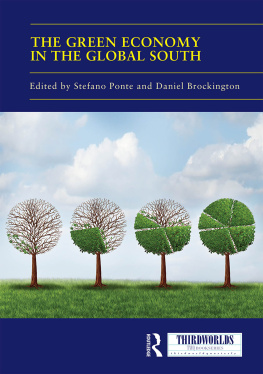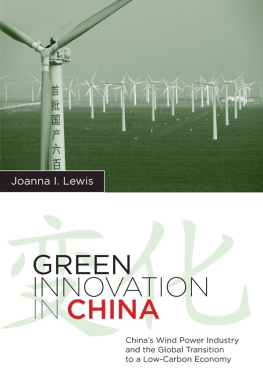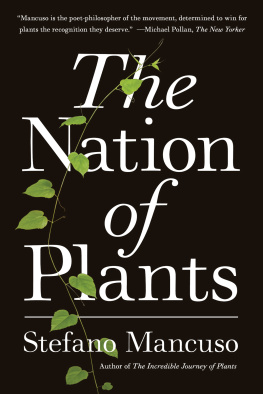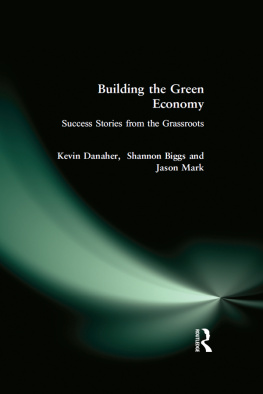The Green Economy in the Global South
The idea and practice of the green economy is gaining momentum, coinciding with financial instability, and continued economic woe in the Global North, but generally more positive economic circumstances in the Global South. Green economic initiatives in the Global South are multiplying, and include carbon payments, ecotourism, community-based wildlife management, sustainability certification initiatives, and offsets by mining companies exploiting new resources. These initiatives are reallocating resources, redefining inequalities, and redistributing the fortune and misfortune of participants of the green economy and those excluded from it. They have also led to resistance locally, nationally, and transnationally and to demands for alternatives to market-driven instruments and solutions, which are generally gaining strength and coherence. The articles included in this volume bring together a multi-disciplinary team of scholars from North and South to provide nuanced analyses of green economy experiences in the Global South analysing the opportunities they provide, but also the redistributions they entail and the kinds of resistances they face. The ultimate aim of the collection is to provide a critical, but balanced, overview of the emerging green economy in the Global South and point the way to possible adjustments, alternatives or radical resistance, depending on different situations. This book was originally published as a special issue of Third World Quarterly.
Stefano Ponte is a Professor in the Department of Business and Politics, Copenhagen Business School. His research focuses on global value chains, the political economy of sustainability initiatives, and transnational environmental governance.
Daniel Brockington is Director of the Sheffield Institute for International Development at the University of Sheffield where he holds a research chair. His research covers issues of conservation and environmental policy, celebrity advocacy, and livelihood change.
Thirdworlds
Edited by Shahid Qadir, University of London
THIRDWORLDS will focus on the political economy, development and cultures of those parts of the world that have experienced the most political, social, and economic upheaval, and which have faced the greatest challenges of the postcolonial world under globalisation: poverty, displacement and diaspora, environmental degradation, human and civil rights abuses, war, hunger, and disease.
THIRDWORLDS serves as a signifier of oppositional emerging economies and cultures ranging from Africa, Asia, Latin America, Middle East, and even those Souths within a larger perceived North, such as the U.S. South and Mediterranean Europe. The study of these otherwise disparate and discontinuous areas, known collectively as the Global South, demonstrates that as globalisation pervades the planet, the south, as a synonym for subalterity, also transcends geographical and ideological frontiers.
Recent titles include:
New Actors and Alliances in Development
Edited by Lisa Ann Richey and Stefano Ponte
The Political Invention of Fragile States
The Power of Ideas
Edited by Sonja Grimm, Nicolas Lemay-Hebert and Olivier Nay
Global Land Grabs
History, Theory and Method
Edited by Marc Edelman, Carlos Oya and Saturnino M. Borras Jr.
The Afghan Conundrum: intervention, statebuilding and resistance
Edited by Jonathan Goodhand and Mark Sedra
Emerging Powers and the UN
What Kind of Development Partnership?
Edited by Thomas G. Weiss and Adriana Erthal Abdenur
Corruption in the Aftermath of War
Edited by Jonas Lindberg and Camilla Orjuela
Everyday Energy Politics in Central Asia and the Caucasus
Citizens Needs, Entitlements and Struggles for Access
Edited by David Gullette and Jeanne Faux de la Croix
The UN and the Global South 1945 and 2015
Edited by Thomas G. Weiss and Pallavi Roy
The Green Economy in the Global South
Edited by Stefano Ponte and Daniel Brockington
Food Sovereignty: convergence and contradictions, condition and challenges
Edited by Eric Holt-Gimenez, Alberto Alonso-Fradejas, Todd Holmes and Martha Robbins
The International Politics of Ebola
Edited by Anne Roemer-Mahler and Simon Rushton
Rising Powers and South-South Cooperation
Edited by Kevin Gray and Barry K. Gills
The Local Turn in Peacebuilding: the liberal peace challenged
Edited by Joakim jendal, Isabell Schierenbeck and Caroline Hughes
The Green Economy in the Global South
The idea and practice of the green economy is gaining momentum, coinciding with financial instability, and continued economic woe in the Global North, but generally more positive economic circumstances in the Global South. Green economic initiatives in the Global South are multiplying, and include carbon payments, ecotourism, community-based wildlife management, sustainability certification initiatives, and offsets by mining companies exploiting new resources. These initiatives are reallocating resources, redefining inequalities, and redistributing the fortune and misfortune of participants of the green economy and those excluded from it. They have also led to resistance locally, nationally, and transnationally and to demands for alternatives to market-driven instruments and solutions, which are generally gaining strength and coherence. The articles included in this volume bring together a multi-disciplinary team of scholars from North and South to provide nuanced analyses of green economy experiences in the Global South analysing the opportunities they provide, but also the redistributions they entail and the kinds of resistances they face. The ultimate aim of the collection is to provide a critical, but balanced, overview of the emerging green economy in the Global South and point the way to possible adjustments, alternatives or radical resistance, depending on different situations. This book was originally published as a special issue of Third World Quarterly.
Stefano Ponte is a Professor in the Department of Business and Politics, Copenhagen Business School. His research focuses on global value chains, the political economy of sustainability initiatives, and transnational environmental governance.
Daniel Brockington is Director of the Sheffield Institute for International Development at the University of Sheffield where he holds a research chair. His research covers issues of conservation and environmental policy, celebrity advocacy, and livelihood change.
First published 2017
by Routledge
2 Park Square, Milton Park, Abingdon, Oxon, OX14 4RN, UK
and by Routledge
711 Third Avenue, New York, NY 10017, USA
Routledge is an imprint of the Taylor & Francis Group, an informa business
Introduction, Chapters 1-3, Chapters 5-8 2017 Southseries Inc.
Chapter 4 Michela Marcatelli
All rights reserved. No part of this book may be reprinted or reproduced or utilised in any form or by any electronic, mechanical, or other means, now known or hereafter invented, including photocopying and recording, or in any information storage or retrieval system, without permission in writing from the publishers.
Trademark notice: Product or corporate names may be trademarks or registered trademarks, and are used only for identification and explanation without intent to infringe.
British Library Cataloguing in Publication Data
A catalogue record for this book is available from the British Library
ISBN 13: 978-1-138-29120-1










